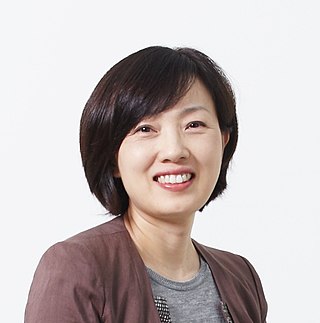
V. Narry Kim is a South Korean biochemist and microbiologist, best known for her work on microRNA biogenesis. Her pioneering studies have laid the groundwork for the biology of microRNA and contributed to the improvement of RNA interference technologies.

Noh Tae-won is a South Korean physicist and director of the Center for Correlated Electron Systems (CCES) in the Institute for Basic Science (IBS) at Seoul National University (SNU). He has published more 400 papers and been cited 15,000 times. He is a member of the Materials Research Society, Korean Optical Society, Korean Crystallographic Society, and Association of Asia Pacific Physical Societies and been on several editorial boards for journals. In 2017, he became president of the Korean Dielectrics Society.

Yeom Han-woong is a South Korean physicist. A tenured professor at POSTECH, he has led several research centers for the university and from 2013 in collaboration with the Institute for Basic Science. He is a Fellow of the American Physical Society and has served as vice chairman of the Korean government's first science and technology advisory group for three consecutive terms. With more than 300 publications to his name, his research has been cited over 5,000 times giving him an h-index of 40 and i10-index of 125.

Lee Young-hee is a South Korean physicist. He is a distinguished professor in physics and energy science at Sungkyunkwan University as a SKKU fellow. He is also director of the Center for Integrated Nanostructure Physics in the Institute for Basic Science (IBS). He has been a Clarivate Analytics Highly Cited Researcher in the cross-field category in 2018–2023.
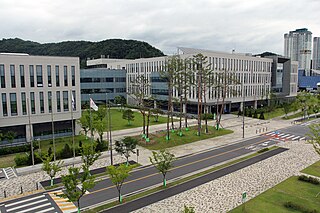
The Institute for Basic Science is a Korean government-funded research institute that conducts basic science research and relevant pure basic research. Comprising approximately 30 research centers with more than 60 research groups across the nation and a headquarters in Daejeon, IBS has approximately 1,800 researchers and doctoral course students. Around 30% of the researchers are from countries outside South Korea. The organization is under the Ministry of Science and ICT.

Koh Gou Young is a researcher from South Korea studying organ vasculature and lymphatic vessels with an interest in angiogenesis, lymphangiogenesis, adipogenesis, and cardiogenesis. His research has contributed to the publication of more than 200 journal articles, including multiple publications on how Tie2 deficits are related to sepsis, blood-retinal barrier damage, and an imbalance of intraocular pressure in Schlemm's canal which induces glaucoma.
The Kyung-Ahm Prize is a series of awards presented annually from the Kyung-Ahm Education & Cultural Foundation. Founded in 2005 with a 100 billion KRW endowment by Geum-Jo Song, the award originally had four categories and in addition to the award, laureates are given 100 million KRW to 200 million KRW in prize money; the highest nationally. The foundation also hosts academic lectures by laureates.
The Korea Science Award is an award presented to South Koreans and Korean scientists working in domestic universities or research positions. It is currently jointly presented by the Ministry of Science and ICT and the National Research Foundation of Korea. Research achievements are limited to that of a single project conducted in Korea. Potential recipients go through a several stage review which includes consolation with foreign scholars.

Oh Se-jung is a South Korean politician and physicist. He has served as the director of the Korean Federation of Science and Technology Societies, the first president of the Institute for Basic Science, and the 27th president of Seoul National University.

Noh Do Young is a South Korean physicist specializing in condensed matter physics and materials science using synchrotrons and XFELs. He has developed and applied various frontier X-ray diffraction methods to study condensed matter systems, including recent coherent X-ray diffraction imaging technique. His research has utilized a number of synchrotron radiation facilities, such as Advanced Photon Source, SPring-8, National Synchrotron Light Source, PLS, and X-ray free electron lasers, including SCALA and PAL-XFEL.
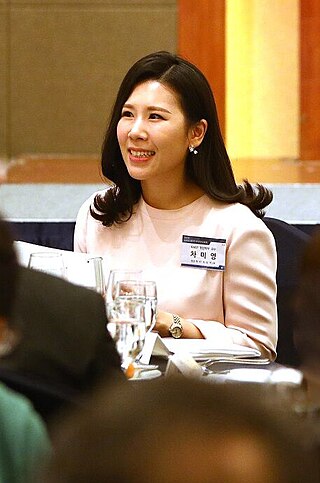
Cha Meeyoung, sometimes known as Mia, is an associate professor at KAIST in the School of Computing and a chief investigator in the Pioneer Research Center for Mathematical and Computational Sciences at the Institute for Basic Science. Her research focuses on network and data science with an emphasis on modeling, analyzing complex information propagation processes, machine learning-based computational social science, and deep learning. In June 2024, she will become the scientific director of the Max Planck Institute for Security and Privacy. She has served on the editorial boards of the journals PeerJ and ACM Transactions on Social Computing.
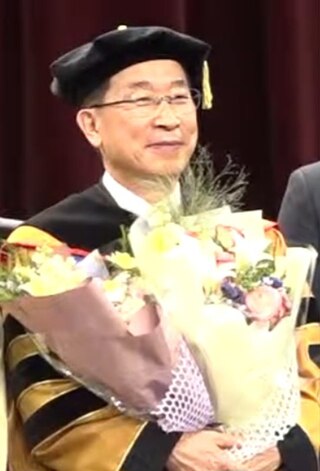
Kuk Young is a South Korean physicist, former physics professor and vice-provost of research of Seoul National University, distinguished professor of Ewha Womans University, and chairman of the Samsung Science and Technology Foundation. He is a fellow of the American Physical Society, Korean Academy of Science and Technology, Institute of Physics, Korean Physical Society, and Korean Vacuum Society. He has performed editor roles for the journals Nanotechnology, ACS Nano, and Solid State Electronics and was the fourth president of Daegu Gyeongbuk Institute of Science and Technology (DGIST).

Choi Kiwoon is a theoretical particle physicist researching focusing on particle theory and cosmology. He was a research professor at Chonbuk National University and a full professor at KAIST. He is the founding director of the Institute for Basic Science Center for Theoretical Physics of the Universe. He is a member of the Korean Academy of Science and Technology.
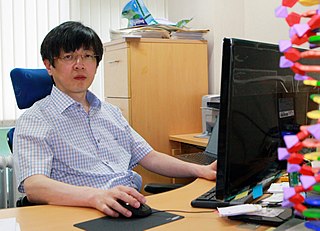
Kim Jin-Soo is a chemist, biologist, and entrepreneur. He was CEO and CSO, ToolGen, Inc., is a professor in the Department of Chemistry of Seoul National University and director of the Center for Genome Engineering. His research team has developed and improved several types of programmable nucleases, specifically zinc finger nucleases (ZFNs), TAL effector nucleases (TALENs), and RNA-guided engineered nucleases (RGENs). In 2018, he was a Clarivate Analytics Highly Cited Researcher in the cross-field category and in the biology and biochemistry category in 2019.

Oum Sang-il is a Korean mathematician working in graph theory and discrete mathematics. He is a tenured professor in the Department of Mathematical Sciences at KAIST and the chief investigator of the Discrete Mathematics Group in the Pioneer Research Center for Mathematical and Computational Sciences at the Institute for Basic Science. He is known for his work on structural graph theory and in particular for structures and algorithms relating to rank-width, clique-width, and branch-width. He published more than 45 journal papers.
The Young Scientist Award is a Korean award for young scientists under the age of 40 with research and development achievements in the natural sciences and engineering fields. Four recipients are selected on an annual basis. While the award is organized by the Korean Academy of Science and Technology, it is given on behalf of the president of Korea, and comes with prize money of initially KRW 30 million, and later KRW 50 million. Candidates for the award must be Korean or working within Korea at a university or research institute. The award is presented to natural science researchers in even-numbered years and engineering in odd-numbered years.

Park Jeong Young (Korean: 박정영), sometimes written as Park, Jeong Y., is a professor in the Department of Chemistry at KAIST and associate director at the Center for Nanomaterials and Chemical Reactions at the Institute for Basic Science. He is a member of the American Chemical Society and American Vacuum Society among others, an international committee member of Asian Science Camp, and has served on the editorial boards of Scientific Reports, Advanced Materials Interfaces, Journal of the Korean Physical Society, and New Physics.
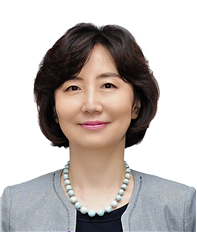
Inhee Mook-Jung (묵인희) is a South Korean scientist who works at the Seoul National University School of Medicine.
The Inchon Award (Korean: 인촌상) is a prize given to individuals in public service, journalists, and academics for achievements in their field. The award is named after the nickname of Kim Seong-su; the second Vice President of South Korea and founder of Korea University, The Dong-a Ilbo and Gyeongseong Textiles. The annual award is presented with a prize of KRW 100 million, a citation and a medal on October 11 which is Kim's birthday.
The Sudang Award (Korean: 수당상) is an academic prize meant to honor the achievements of researchers and contribute to the development of technology and academics by awarding awards basic science, applied science, humanities and social sciences, and formerly natural science. The award is presented by the Sudang Foundation which is under Samyang Group. Laureates receive KRW 200 million and plaque as part of the award.















